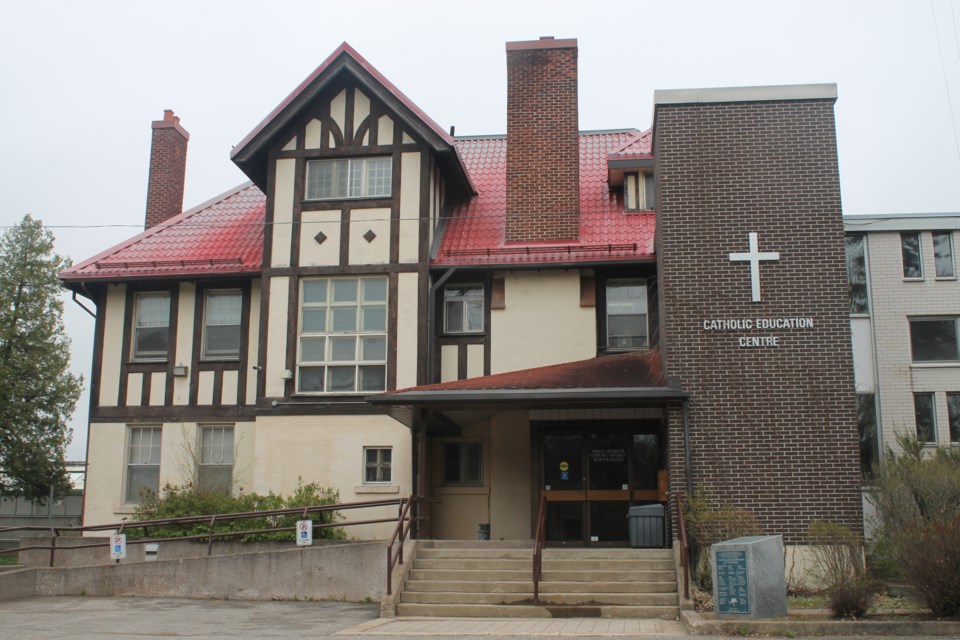Huron-Superior Catholic District School Board (H-SCDSB) officials are awaiting direction from the Ontario Catholic School Trustees Association after a recent complaint from a student against a southern Ontario Catholic school board.
The complaint, first filed by a student’s lawyers in 2016, was set to go to the Ontario Human Rights Tribunal, but a private settlement has been reached between the student and the Simcoe Muskoka Catholic District School Board.
The settlement could have a ripple effect on Catholic education across the province, including the Sault and area.
Lawyers for student Claudia Sorgini in Midland, Ontario say the Simcoe Muskoka Catholic District School Board discriminated against her after she successfully obtained an exemption from religious education classes by not letting her audit a science class, and also allege the board would not allow her to attend certain events, including the school prom.
The Simcoe Muskoka board has changed its policy to allow students to opt out of religious education, without providing a reason for their exemption request.
Once the board’s revised policy is filed with the Ontario Human Rights Commission, the Ontario Catholic School Trustees Association is expected to distribute the board’s new policy with all 29 English Catholic school boards in the province, including Huron-Superior.
“Certainly it’s a concern,” said John Stadnyk, H-SCDSB director of education, speaking to SooToday.
Stadnyk said he first learned of the development this week.
“Right now we have students who are Catholic and non-Catholic…but it’s been our policy that if a student is enrolled in our schools that they take religion each of the four years. Any request for exemption would come through the director,” Stadnyk said.
“That’s been our policy for as long as I’ve been director.”
Many non-Catholic students attend Catholic schools because of geographic reasons or because of course availability.
Stadnyk became the Huron-Superior Catholic District School Board’s director in 2005, and retires June 30 after an education career that began in the 1970s.
“When people choose to enrol at St. Mary’s College we make the expectation, we say ‘this is a Catholic school and the expectation would be you’re taking religion in each of the years you’re with us,’ so I think stating the expectation up front is helpful,” said Rose Burton Spohn, H-SCDSB superintendent, who succeeds Stadnyk as the board’s director of education effective July 1.
“So far, we get very few requests for exceptions because we’re very clear from the outset.”
Stadnyk said the most recent Huron-Superior exemption concerned a student who had “special needs that needed accommodation in other subjects.”
Stadnyk said he anticipates most Huron-Superior students will continue to opt for religious education because the classes have interesting content, and also because the board has traditionally done much to accommodate students in their efforts to complete the courses they need to graduate from the H-SCDSB (such as providing religious education through summer school and e-learning).
“Most students honour that requirement (to take religious education).”
“Our Catholic faith has values that transcend faith. In our World Religions course, you learn about world religions, you learn about moral issues, it’s a course that generates a lot of interest, charity and justice are a part of it, so we’ve had very few requests (for exemptions from religious education),” Stadnyk said.
“I don’t believe we would pressure students.”
“I would hope it would never go to that, in our board we would try to find an integrative solution to a complex situation. We would find solutions, we’ve had so few of these exemption requests coming, I think that’s a testament (to the board’s flexibility),” Stadnyk said.
“We’re hoping that people will take the courses because they want to, because of things that can benefit them in terms of their outlook on the world, learning about justice issues.”
Burton Spohn said religious education at the high school level consists, in Grade 9, of focusing on the individual.
“I’ve yet to meet a teenager who wasn’t interested in learning about themselves, Grade 11 is World Religions, Grade 12 is World Issues, Grade 10 tends to be more Christianity-based in terms of references to Scripture, so I think there’s broad appeal to the courses, it’s quite a broad spectrum,” Burton Spohn said, adding the courses will assist graduates in dealing with issues such as euthanasia, quite possibly in their chosen professions after high school.
“I think that at the elementary level too, a lot of families are choosing to have our children attend our schools, to have a value set to help their children be better citizens, centred on Jesus and His teaching, caring for others, charity,” Stadnyk said.
Meanwhile, Stadnyk said the Huron-Superior board will wait to hear from the Ontario Catholic School Trustees Association (OCSTA).
“We will look at those guidelines and if we have to revise our procedures we certainly will.”
